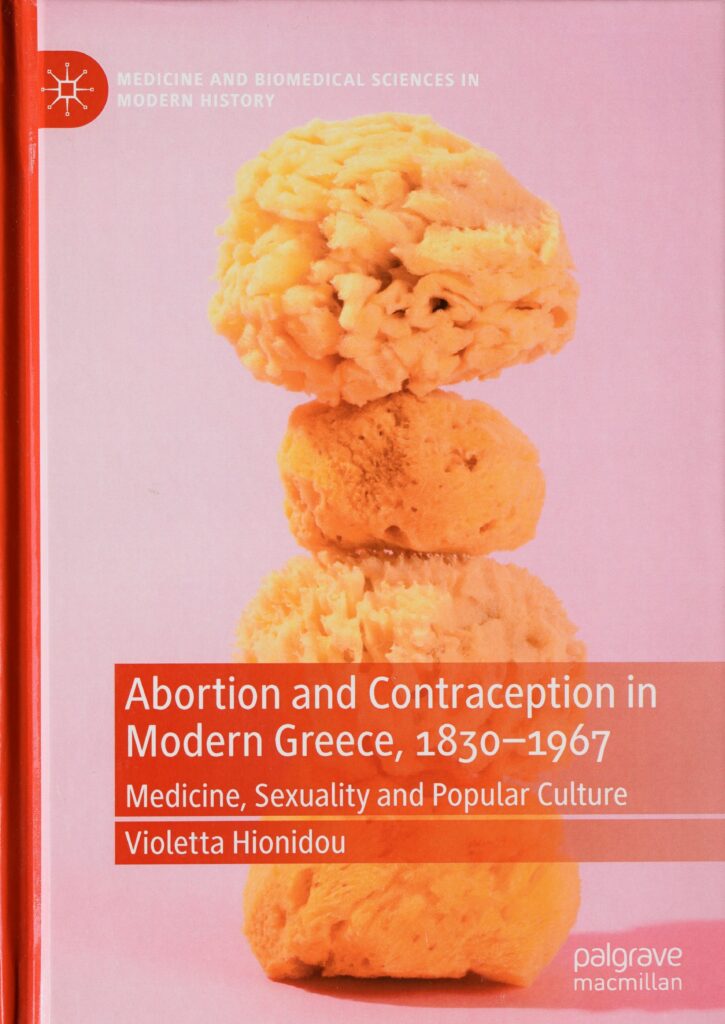Violetta Hionidou
Abortion and Contraception in Modern Greece, 1830-1967 examines the history of abortion and contraception in Modern Greece, from the time of its creation to the introduction of the Pill. It situates this history within the historiography of the fertility decline, and asks whether this decline was due to changing social conditions or to the development of innovative contraceptive methods.

NOTCHES: In a few sentences, what is your book about? Why will people want to read your book?
Violetta Hionidou: The book explores the transition from high fertility to low fertility in Greece that essentially occurred in the first six decades of the twentieth century, in the absence of ‘modern’ contraceptives. It emphasises that women – and to a degree physicians too – were always preoccupied with their fertility or its absence. Women in the more distant past often wished for high fertility, and employed herbals and pessaries in order to achieve that. Physicians also assisted them with the provision of medicines or curettage to the same effect. At a later point in time when women wished for fewer children, they again used herbals and pessaries to that effect, with physicians assisting them again with the employment of curettage. Nevertheless, fertility among the Greeks was never very high, even when not controlled, largely due to migration.
The book is re-emphasises the centrality of women as the instigators of fertility decline, employing both natural and artificial contraceptive and abortion methods. Among the first generation of women who sought to reduce their fertility, they even employed withdrawal, a method we now associate exclusively with men. Greek men contributed significantly to the control of fertility, extensively employing withdrawal, but only in subsequent generations. The role of physicians was pivotal in encouraging or instructing women and couples to control their fertility for ‘health’ reasons.
The book offers a new perspective on the workings of modern Greek society by investigating the views and operations of the law, the church, the physicians and the state, but also the individuals on the issues of contraception and abortion. And so it helps the reader to understand why abortion remains central in the control of fertility today, while contraception plays only a secondary role.
NOTCHES: What drew you to this topic, and what questions do you still have?
Hionidou: As I am an historical demographer by training, the question of fertility decline was a central one in my PhD, which focused on the population of the island of Mykonos. Since then I have never lost sight of the question ‘how was fertility decline achieved’? Focusing on Modern Greece was the natural extension of my PhD research; however, this led me to use different methodologies, such as oral history; new sources, such as folklore accounts; and delving into religious, legal and medical history.
Researching for this book made me realise how little we know about sexuality in twentieth century Greece, especially in the first half of the century! This is a topic that will hopefully garner more attention in the near future.
NOTCHES: How did you research the book? What sources did you use, and were there any especially exciting discoveries, or any particular challenges?
Hionidou: I started by investigating the point of view of those who were among the first to use contraception and abortion, something that remains a rarity. For this I used oral histories that I had collected since 1994, but also columns in women’s popular magazines where they would write anonymously to the resident gynaecologist asking for advice on ‘women’s issues’. Gradually I realised I had to incorporate the views of the church, so I employed church publications and opinion pieces from clerics of all ranks. I explored the law and its evolution, but also the degree to which this was observed utilising legal publications and court cases. The evolving knowledge and role of the physicians was investigated through their numerous publications (monographs, textbooks and articles), but also through the frequent references to them in my oral histories. At a rather late stage I decided to incorporate social and medical attitudes towards childlessness, something that emphasised the importance of childbearing in Greek society. This is imperative to understand for anyone investigating the decline in fertility.
I found particularly rewarding the re-interpretation of my 1994 oral histories. These revealed how the language of women in the pre-fertility control era differed from that of later cohorts when referring to the termination of pregnancy, reflecting the use of different methods with very different levels of efficiency.
NOTCHES: Whose stories or what topics were left out of your book and why? What would you include had you been able to?
Hionidou: The book deals exclusively with married couples, partly because childbearing outside marriage was extremely low at the time – or it so appears in official statistics. I would have loved to have been able to examine the sexuality and contraception/abortion practices of unmarried couples, whether these were based in rural parts of the country where such illicit relationships were hard to maintain or among liberal Athenians where we know that, at least in some circles, such couples abounded.
NOTCHES: Did the book shift significantly from the time you first conceptualized it?
Hionidou: Yes it did. This may be a reflection of the length of time it took me to finish it! The decision to include a chapter on childlessness was a late but important addition, as it helps the reader to understand the shift from a culture that focused on assisting childbearing to one that catered for its restriction. I also had to significantly expand my research on the writings of physicians in relation to their attitudes towards controlling fertility as I realised there had not been much written on this, especially not for Greece but also for most other historical populations. At an early point in time, I decided to publish an article on popular medicine in Greece, so that it could be referenced in the book. While this could not have been incorporated in the book, I felt I could not have published the book, especially chapter 4 on ‘Emmenagogues and Abortifacients’, without such a reference.
NOTCHES: How did you become interested in the history of sexuality?
Hionidou: I have always been interested in fertility – the longest chapter of my PhD dissertation was dedicated to it. It always seemed self-evident to me that the link between fertility and sex was clear to see for all. However, reading much of the literature at the time, someone could have easily assumed that the two were not linked. I made the point of never forgetting this, as other academics and authors have done so in recent years.
NOTCHES: How do you see your book being most effectively used in the classroom? What would you assign it with?
Hionidou: I have been teaching a third-year module on ‘The History of Birth Control’ at Newcastle since 2006. My students were taught some of the material included in the book over the years. They found the interviews particularly fascinating- on many occasions they have been the basis of our seminar discussions. Two books are particularly suited to accompany the book: the edited volume by Etienne van de Walle and Elisha P. Renne, Regulating Menstruation: Beliefs, Practices, Interpretations which discusses emmenagogues and abortifacients both in historical and contemporary settings, as my book does for modern Greece; and, Simon Szreter and Kate Fisher’s Sex Before the Sexual Revolution. Intimate Life in England 1918-1963 , which investigates similar questions to mine but for England, though within a narrower time frame.
NOTCHES: Why does this history matter today?
Hionidou: The decline in fertility has been rather invisible to historians, partly because it has been – mostly – a slow process. However, it has transformed societies, families, our relationships within families and ultimately women’s position in society. That means that it is imperative to know and understand how fertility declines occurred in societies and how they differed from one to another so that we can proceed in understanding the subsequent changes, changes that ultimately the decline in fertility brought about.
This history also matters because it helps us to understand the differing positions of populations and states towards abortion. Greece currently, and since the 1980s, has one of the most liberal laws and practices of abortion in the world. This can only be understood through an examination of the history of abortion provision and practices among the Greek population, a central issue of the book.
NOTCHES: Your book is published, what next?
Hionidou: As I was writing the last pages of the book at Princeton, during my Stanley J. Seeger Visiting Fellowship in Hellenic Studies, I had already started researching my next monograph. This is about population movements in occupied Greece during WWII and the causes and effects of such movements.
 Violetta Hionidou is Professor of Modern European History at the School of History, Classics and Archaeology, Newcastle University. Her areas of expertise are famines; birth control, abortion and fertility in historical populations; popular and modern medicine in modern Greece; family history; identities and experiences of exile of Pontic Greeks from the former USSR; and, recently, migration in times of famines. Her research is interdisciplinary, frequently employing oral history. She is keen to extend the impact of her research to society, and created the GreekFamilyHistory website to offer detailed guidance on how to undertake family history with Greek sources. She has held both the Visiting Research Fellowship at Princeton University, Seeger Centre for Hellenic Studies (2019) and the George Papaioannou Fellowship at The American School of Classical Studies at Athens. Her research has been published in numerous peer-reviewed journals, and her monograph Famine and Death in Occupied Greece, 1941-1944 was the co-winner of the 2007 Edmund Keely book award.
Violetta Hionidou is Professor of Modern European History at the School of History, Classics and Archaeology, Newcastle University. Her areas of expertise are famines; birth control, abortion and fertility in historical populations; popular and modern medicine in modern Greece; family history; identities and experiences of exile of Pontic Greeks from the former USSR; and, recently, migration in times of famines. Her research is interdisciplinary, frequently employing oral history. She is keen to extend the impact of her research to society, and created the GreekFamilyHistory website to offer detailed guidance on how to undertake family history with Greek sources. She has held both the Visiting Research Fellowship at Princeton University, Seeger Centre for Hellenic Studies (2019) and the George Papaioannou Fellowship at The American School of Classical Studies at Athens. Her research has been published in numerous peer-reviewed journals, and her monograph Famine and Death in Occupied Greece, 1941-1944 was the co-winner of the 2007 Edmund Keely book award.

NOTCHES: (re)marks on the history of sexuality is licensed under a Creative Commons Attribution-NonCommercial-NoDerivatives 4.0 International License.
Based on a work at www.notchesblog.com.
For permission to publish any NOTCHES post in whole or in part please contact the editors at NotchesBlog@gmail.com




